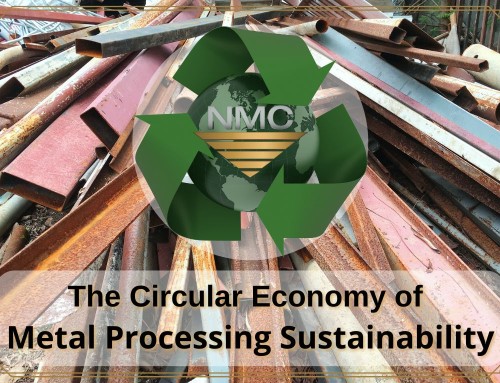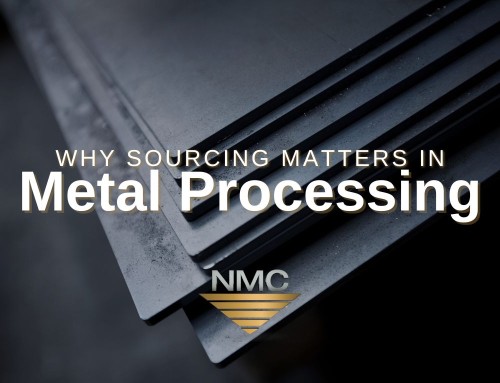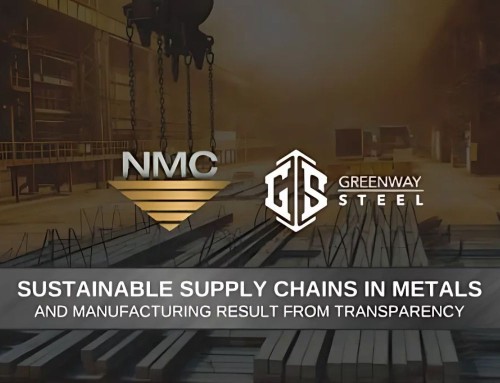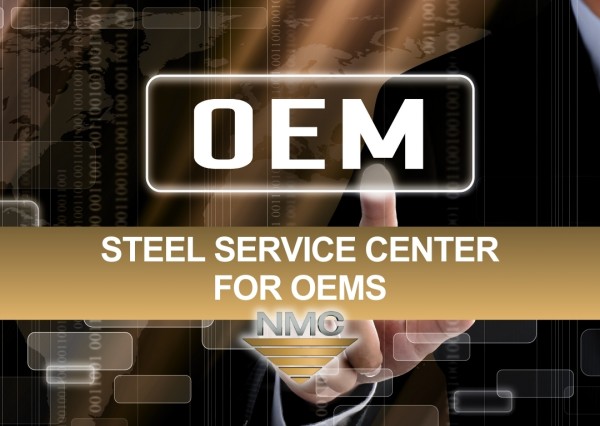
For companies that make original equipment (OEMs), finding the best materials is more than just important — it gives them an edge over others. Steel service centers for OEMs, like National Material Company (NMC), are essential. They ensure OEMs get the best steel that fits their needs, helping them work better, make more profit, and improve operations.
Steel service centers like NMC bridge the gap between steel mills and OEMs, offering precision cutting, slitting, and processing. This partnership allows OEMs to focus on core activities while trusting service centers for consistent, ready-to-use materials. This blog explores the role of a steel service center for OEMs, highlighting how NMC streamlines operations, improves product quality, and reduces costs.
What Does it Mean to Be an Original Equipment Manufacturer (OEM)?
An original equipment manufacturer (OEM) produces parts or components that another company incorporates into its products, which are then sold under that company’s brand. OEMs are common in industries such as automotive and computing.
For example, a branded laptop might source processors or memory modules from an OEM. OEMs typically produce parts for value-added resellers (VARs), focusing on manufacturing rather than the final product design.
Historically, OEMs have sold primarily to other businesses rather than directly to consumers. However, some OEMs now also sell parts directly for consumer repairs.
What are Alternatives to OEM Parts?
Ensuring a steady supply of cost-effective spare parts is critical for any manufacturing operation. Managing spare parts inventory represents a significant and inevitable cost for companies utilizing industrial machinery.
While OEMs might be the go-to for all necessary spares and components, the market offers other alternatives such as OE, ODM, and aftermarket parts.
OE Components:
Produced by a different company but meet the same factory standards as OEM parts.
ODM (Original Design Manufacturer):
An original design manufacturer (ODM) is distinct from an OEM. ODMs create products based on a client’s specifications, which the client then sells under their brand. ODMs have less design leeway than OEMs because they work within client-provided specifications. However, this model benefits from reduced R&D costs, lowering consumer prices.
Aftermarket:
While OEMs produce original equipment, aftermarket manufacturers create products compatible with OEM parts. In essence, aftermarket parts are non-original replacements made by companies — either local or international — without the authorization of the original manufacturers. These parts are often less expensive but may not guarantee the same level of performance as OEM products.
What are the Advantages of Purchasing OEM Products?
• Superior quality: OEM products, crafted by the original creators, offer unmatched quality compared to alternatives. The premium price reflects their superior construction.
• Longevity: Built to last, OEM products, such as spare tires, ensure the material’s quality and durability.
• Extended service life: OEM components generally have a longer service life than aftermarket parts, providing better value over time.
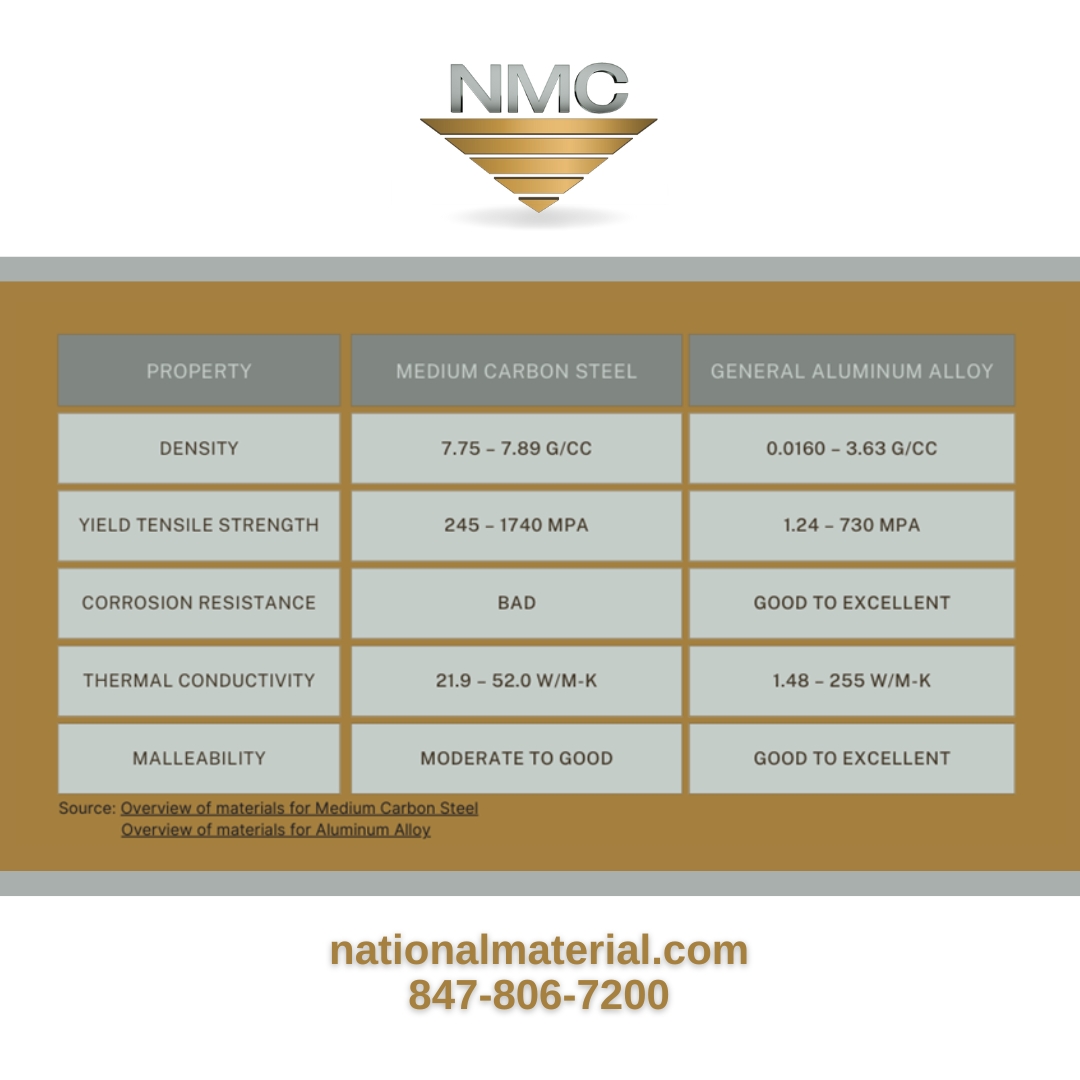
Key Differences Between Aluminum and Steel
Choosing the right material for your project is crucial. Here’s a quick comparison of steel versus aluminum and their typical uses:
• Weight: Aluminum is lighter, with steel being up to three times heavier for equal-sized pieces.
• Strength: Steel is generally stronger, but aluminum has a better strength-to-weight ratio.
• Malleability: Aluminum is more malleable and suited for extrusion and rolling, while steel is harder to shape.
• Thermal conductivity: Aluminum conducts heat better, ideal for heat sinks and heat distribution.
• Corrosion resistance: Aluminum naturally resists corrosion, while steel requires treatment or stainless options.
• Cost: Carbon steel is generally cheaper than aluminum alloy.
• Applications for aluminum and steel: Aluminum and steel are used in various industries, including transportation, infrastructure, and manufacturing, each chosen based on specific material properties and application needs.
Applications for Aluminum and Steel
Knowing the common uses of each metal can guide your choice. Here’s a brief overview of typical industries and applications for each metal.
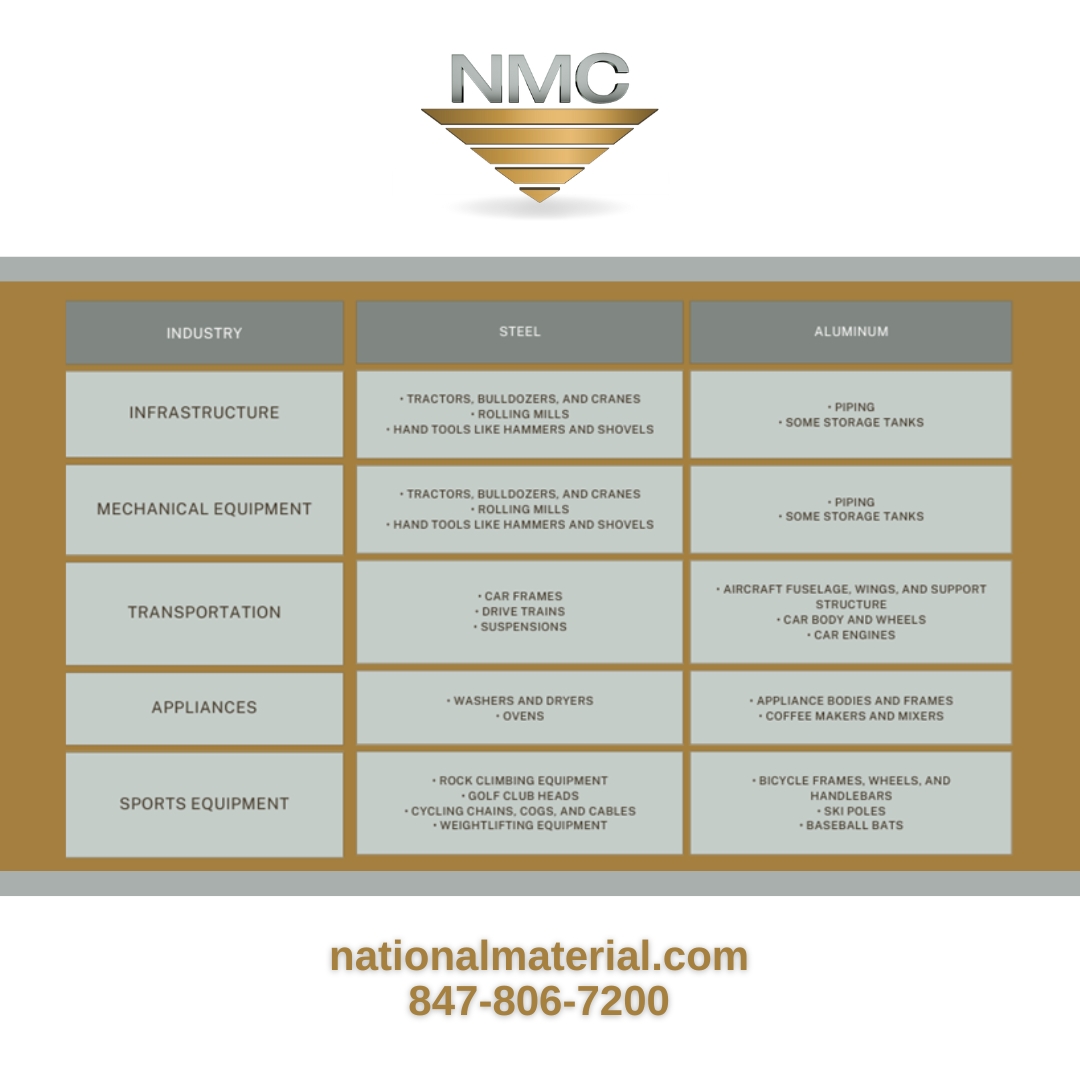
How Do Steel Service Centers Fulfill Your Steel and Aluminum Requirements?
Steel service centers for OEMs play a vital role in the steel distribution network, acting as intermediaries between steel producers and their customers. They handle large steel purchases, manage stock, and tailor steel products to client specifications. These centers serve various industries, including automotive, electronics, HVAC, transportation, construction, and home appliances.
By managing the steel supply chain, steel service centers for OEMs allow clients to focus on their core business activities. They also modify bulk steel into required forms and sizes, ensuring timely delivery based on client agreements.
5 Benefits of Sourcing Steel from a Steel Service Center
Steel’s versatility and strength make it indispensable in various sectors like construction, automotive, and manufacturing. Partnering with a trustworthy OEM steel supplier is vital for quality and punctuality. Here are five benefits of sourcing from a steel service center:
1. All-in-one convenience — A key advantage of a steel service center is its all-in-one convenience. These centers provide various services, such as cutting, drilling, and welding, alongside a wide selection of steel types like carbon, stainless, and aluminum in various forms and sizes. This eliminates the hassle of dealing with multiple suppliers and saves on time and transportation costs.
2. Assured quality — Steel service centers implement rigorous quality checks and sourcing from esteemed manufacturers to ensure consistent material quality.
3. Economical pricing — Customers can enjoy cost benefits when buying from steel service centers due to bulk purchasing power that allows for better deals from manufacturers. Efficient processing capabilities also mean reduced preparation time and labor, leading to lower production costs for customers.
4. Timely delivery — Just-in-time delivery minimizes inventory risks and enhances efficiency.
5. Expert support — Expert personnel provide guidance on steel selection and fabrication, offering tailored solutions.
Discovering the Ideal Steel Service Center for Your Projects
Cyrus Tang laid the foundation of a steel service center in the vicinity of Chicago in 1964, focusing on electrical grade steels. His venture flourished, leading to an expansion into various flat-rolled steel types. National Material Company, over time, pioneered several processing facilities in North America, including the first independent push-pull pickle line and heavy-gauge galvanizing line. With over fifty years in the steel industry, National Material stands as a frontrunner in flat-rolled steel processing and supply chain management.
Today, NMC is part of National Material Limited Partnership, a conglomerate operating multiple metal-related businesses and ranking among the USA’s top independent steel service center operators. The NMLP group manages 16 steel service centers and processing facilities across North America, distributing over two million tons of steel annually. With twelve facilities in the United States and Mexico, they cater to a broad spectrum of customer requirements.
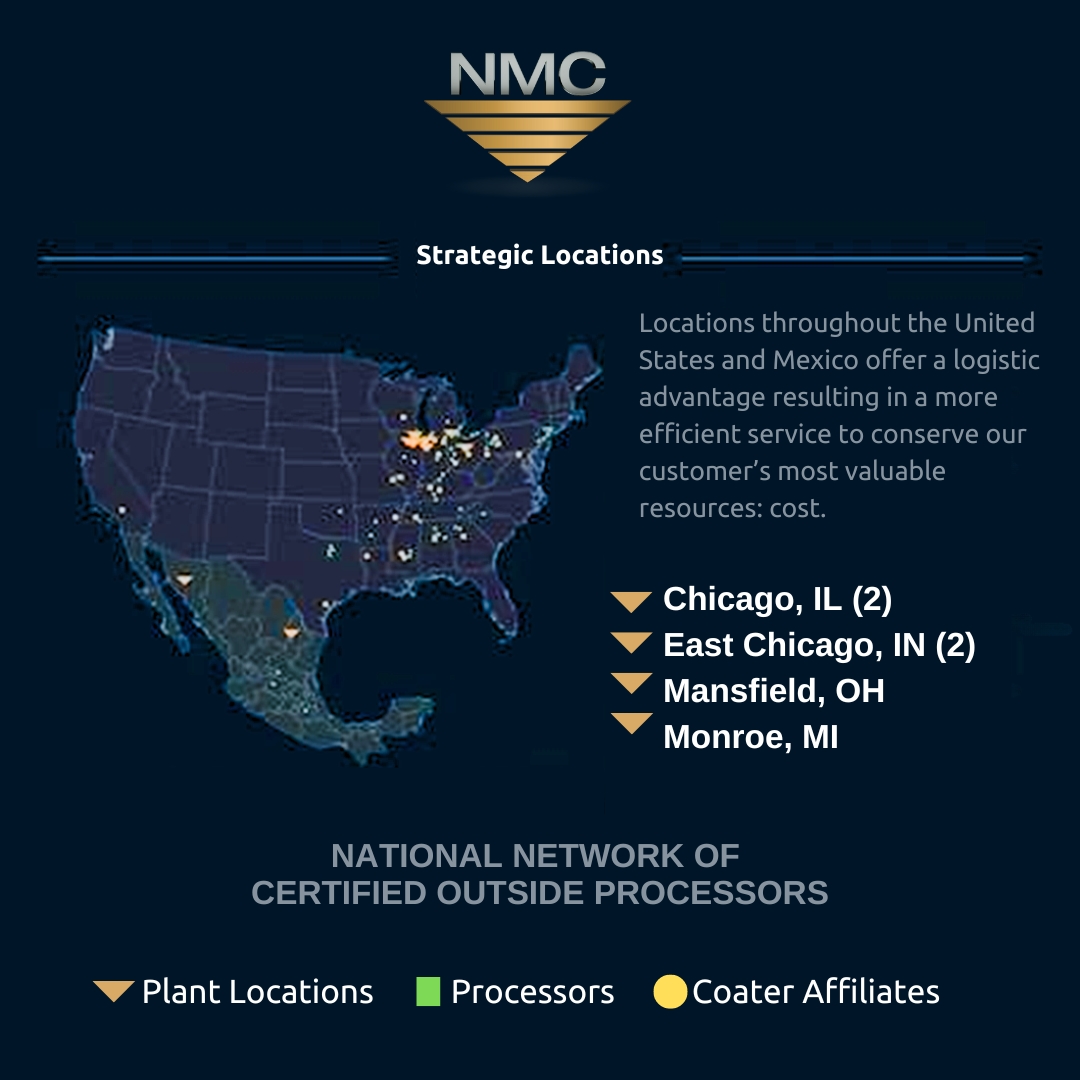
NMC excels in providing efficient steel supply and processing services, boasting unparalleled capacity and expertise in supply chain management. As a leading steel service center for OEMs, NMC is renowned for its leadership in just-in-time delivery programs and inventory management, offering optimal value and service to customers seeking excellence.
Their products, services, and capabilities include the following:
- Hot rolled and cold rolled steel
- Grain oriented and non-oriented electrical steel
- Pre-painted steel
- Galvanized, aluminized, and other coated materials
- Precision slitting
- Steel pickling
- Galvanizing
- Annealing capability
- Cut-to-length processing
- Precision blanking processing
- Complete metallurgical lab and testing facilities
NMC is deeply committed to enhancing customer value, ensuring that every phase of the supply chain is optimized for quality, cost-efficiency, and promptness, thereby delivering excellence at each juncture.
Logistics optimization — Ensuring cost-effective material transit from origin to destination.
- Integrating 22 plants, mills, and a certified processor network for cost-efficiency
- Consolidated freight billing from mill to processor to OEM
- Tailored logistics for all NMC programs
Pricing programs — A variety of pricing options from NMC.
- CRU-indexed contracts for flexible pricing
- Directed buy pricing, allowing OEMs to negotiate directly with mills
- Fixed pricing for specific periods
- Resale options, including value-added services
- Spot pricing for immediate needs
- Hedging/futures to mitigate price fluctuations
Value added / value engineering — Enhancing value beyond the steel’s cost.
- Component evaluations
- Initiatives for mass reduction and light-weighting
- Training on products, processes, and more
Electronic data interchange (EDI) — Boosting transaction accuracy and efficiency.
- Automated processing to reduce manual errors
Outsourced parts — A network of partners providing additional services.
About National Material Company
Strategically positioned plants and a team skilled in steel processing enable NMC to deliver quality services promptly while minimizing client costs. Committed to continuous improvement through extensive supply-chain management, NMC sets industry benchmarks. Holding ISO 9002 certification and maintaining stringent safety standards, NMC has been a leading steel service center for OEMs and a steel manufacturer for half a century and is poised to continue its leadership role.
For more information on NMC, visit their website or contact them at (U.S.) 847-806-7200.

